- Home
- Andrew Wareham
The Fuzzy-Wuzzy Man (The Duty and Destiny Series, Book 3) Page 2
The Fuzzy-Wuzzy Man (The Duty and Destiny Series, Book 3) Read online
Page 2
Frederick envisioned the egg, took the slate from the binnacle and rough sketched the Atlantic coasts east and west and drew his egg shapes on the Line, broad base east, then south, then north, nodded as he accepted Ferrier’s argument.
“So, your sandstorm can happen when the bulk comes close to the desert shores, Mr Ferrier, sweeps across the Saharan fringe. A fascinating theory, sir, and explains much.”
Like so many empirical theories based on observation and insufficient knowledge, it provided an explanation. Not a correct answer but one that justified the pragmatic course. They drifted barely a fortnight in the Doldrums, the southerly current always present, a truly shattering thunderstorm on the thirteenth day announcing the presence of the Westerlies.
“The Cape in less than one hundred days, we may reasonably hope, Mr Ferrier. Charybdis is fortunate in such a master, sir, and I beg you will not hesitate to advise me more.”
They ducked involuntarily as lightning struck the masts yet again, blessed the patent conductors working so effectively. Charybdis was under tight-reefed topsails alone, could have borne more sail to take advantage of the cool, favourable wind, but no officer would have ordered men aloft, or been obeyed if he had tried to. Frederick grinned reflectively, old memories of a nurse, terrified of an English electrical shower and turning the mirrors to the wall. How would she have coped with a tropical storm? Lightning striking within the half mile at five second intervals, maximally; the roar of thunder unending, the separate peals indistinguishable; the strange, indescribable, half-imaginary, burnt-sulphur smell; the threatening metallic green and tan light; the uneasy stirring of the electrical fluid on the skin, hairs raising. Frederick counted himself averagely brave amongst his peers – no berserker hero he, but not shy, either – but he was quite willing to admit that this degree of storm frightened him, and any other honest man, he suspected.
“White in the south-east, Mr Ferrier!”
“Storm edge or squall, sir. No telling which until the last minute.”
Ferrier gave the orders that would let Charybdis slowly pay off before the wind, present her stern quarter rather than her beam to whatever was coming. Tacking was not possible in the circumstances so Ferrier could not bring her round, bows on to the oncoming blast, if such it might be.
“Mr Warren! Man relieving tackles, if you please, yourself to watch over them.”
Warren ran below, belly jouncing mightily, a source of recurrent wonder to Frederick who had daily to remind himself that ‘fat lieutenant’ did not necessarily mean ‘idle, incompetent lieutenant’. His first in the sloop Athene when he had been second had been cadaverous, and a hopeless, incompetent drunk, after all.
“Master’s mate to relay helm orders, Mr Ferrier?”
“Bruce will do it, sir.”
Bruce was Ferrier’s favourite, a quiet-spoken Scot of indeterminate age, sandy haired and pink cheeked, of middle height, all of his features rounded, blurred almost. He had all of his teeth, so was no more than twenty, probably, but he acted like a fifty year old, thinking calmly rather than reacting to any situation. He appeared to be wholly competent, but it was too soon to make a judgement on him. Frederick suspected it might always be ‘too soon’ to make a final assessment of Bruce.
He turned to the boatswain. “Warn all hands, Mr Cheek, but keep them below until the last moment, no need to soak their clothes if it can be avoided.”
The rain was almost horizontal and the watch on deck was saturated, with no shelter and no means to dry their clothes other than hanging them out in the sunshine, when it came again. The fresh water was welcome in one way, rinsing the salt out of harshened shirts and trousers, softening the cloth and easing chafed armpits, wrists and crotches – but there was such a thing as an over abundance, a surfeit, a glut as it were.
“Here she comes, sir,” Cheek, young to be a boatswain, in his twenties perhaps, and able to speak, to initiate conversation even on the quarterdeck, because of the importance of his position, and ready to call the ship’s people to instant response to orders.
There was a gust of wind, noise rising in seconds to a high-pitched howl, and then, ludicrously, nothing. The edge of the storm, a razor-cut transition from chaos to normalcy, passed by and bright sunshine instantly supervened. Within a minute the tropical sun’s heat was drying the deck, the wood changing colour as they watched and the wind veering gently, politely, apologetically into the west, as if nature were somewhat embarrassed by the excesses of the storm. The sea, short and steep, much slower to change and calm, served as the only reminder of the outlandish violence of minutes past.
“Interesting! All hands! Mr Ferrier, be so good as to lay us off a course for Cape Town, all sail conformable.”
The First Lieutenant ran up on deck – the exercise must be good for him!
“Hands to be permitted to rig washing lines, do you think, Mr Warren?”
Housekeeping was the First’s province, not lightly to be interfered with, and today was not Washing Day.
“Certainly, sir, a most humane disposition. The men have collected any amount of fresh water in their tubs and buckets, and Mr Cheek arranged a sail so as to funnel water into a number of barrels. The barrels could not, in the nature of things, be scrubbed out as they would be when watering, so the water will not keep fresh for more than a very few days, so it is as well to use it at once, the men to be at liberty to wash their clothes and, indeed, their persons, and to drink their fill. I have bidden the cook to boil up a mass of suety pudding, to make the most of the opportunity.”
Frederick approved, it was exactly what he would have ordered. It did not occur to him that Warren took great pains in any situation to ask himself what the captain would do, what he would wish, and put that into effect in the unshakeable belief that Captain Harris was never wrong.
Cape Town was surly, had recently been taken from the Dutch, with the acquiescence of the local populace, who hated and feared French Republicanism, but felt that they should have been regarded as willing allies, rather than even mildly subjugated as a conquered foe. The Cape, however, was the Gateway to Africa, to the useful parts of the continent. The West, the Slave Coast, was too fevered to colonise; the North was too Arab, and desert besides; the South was farming land, and farmland was true wealth.
“Kind of the Frogs to give us an excuse, really, Harris,” the Admiral commented. “We would have taken the Cape anyway, sooner or later, force-put, it’s just too valuable to us, midway to India as it is, and without the French threat we would have had to fight like hell, I doubt not!”
“Yes, sir. I am sure you are right, sir. Now, sir, as you have seen from my orders, I must make haste to the Island of Java, in pursuit of some French squadron, of force unknown, and I am most cruelly short-handed.”
Admiral Fenton, cut off in his civil reflections on the state of Africa, smiled cursorily, decided he did not like this bumptious, confident, young man in front of him, was horribly aware that it would be most unwise to offend him. Admirals in hope of another ten years of employment, preferably including a prize-taking command, trod carefully before Harris’ array of influence. He smiled again as he refreshed his memory from his notes – he would enjoy giving the young puppy this information.
“I can set your mind at rest on one issue, Captain Harris. The East India Company’s sloop Viper made her number here last week with dispatches. She saw two frigates, a ship-sloop, a brig and a schooner in company off the Mauritius and east-bound. No names, of course, but her captain went to the masthead with a glass himself, said the frigates were of forty and thirty-two respectively, the post-ship of twenty-two or four, the brig eight, and the schooner a mere cockleshell. They had a store in company, too, though whether prize or their own he could not tell.”
“At least, sir, there is nothing greater than a fifth rate. Taken singly or as a pair they are all within our capacity.”
“They are indeed, Captain Harris, and if you must assail them en masse, then great honour will a
ccrue to you.”
Frederick smiled back – he did not like Admiral Fenton, he decided, ‘honour’ indeed! The sort of honour Grenville won on his Revenge – posthumous! Patronising old bastard!
“As for men, Captain Harris, well, sir, your luck is in! Just three weeks past the Shoreham Indiaman fell foul of what they call a country ship, a vessel belonging to an India merchant independent of John Company yet licensed to trade as long as not running to England. To cut a long story short, Shoreham ran her down – her rudder jamming in the pintles it would seem and them slow to clear it – and the country ship’s master beached her, thinking her perhaps mortally wounded and inadvertently, he says, choosing a rocky shore where she will sit forever, impossible of salvage. He had brought a government cargo for the troops that John Company had felt should have been theirs, or so it is said – and more than enough said!”
Frederick could guess at the threats and the bribery and the collusion that had taken place, and wished to know nothing of it. It was not the navy’s place to investigate a body as powerful as the Honourable East India Company.
“Thirty-six Lascars, Captain Harris, eating my stores and growing fat in idleness. Experienced seamen. I cannot, I believe, press them, as such, but I may certainly put them aboard a ship heading towards India, eventually.”
“Taken with my best thanks, sir. They will be very welcome.”
“You are, you tell me, some eighty men short, Captain Harris. I can make available to you some forty of landsmen, soldiers and mutineers, in irons. The army does not wish to put them before a court, will not willingly send them back to their duty, does not want them to go to England where they may talk. What the whole story is I do not know, but a company of the Thirty Fifth Foot was surrounded by dragoons, disarmed, arrested two days since. I know, for a fact, that the company captain blew his brains out yesterday – somehow obtained a pistol when held under close arrest! I am reliably informed that the lieutenant and ensign have both sent in their papers and return to England on the next ship, held in isolation the while at the fort.”
“The army keeping it quiet, sir. Very discreditable, I doubt not.”
“Just that. The General saw me yesterday, told me the little I know, asked of me that the men be pressed on a ship sailing east. He would much appreciate my cooperation, and I must work closely with him.”
Forty soldiers, used to discipline, easy to train as gun crews and boarders; fighting men. Mutineers, ill-used and out of control, men with a grievance, possibly justifiable. Strong bodies, men he needed, must have; men who could rise in another mutiny – they had done so once already.
“Victuals, water, firewood, sir, fresh food and fruit and vegetables for the people. If we could take these aboard first, say tomorrow and Thursday, bring our stores up so we are ready in all departments, then on Friday in the forenoon when the tide serves, anchor at short stay and your boats bring these soldiers out to us and we shall be at sea before they realise what’s happening to them.”
Blackmail, pure and simple – no fresh food, a stinting on Charybdis’ stores, then the soldiers to be turned away – no favour for the general, no cooperation from the army. Fenton nodded.
“Lighters will come out at dawn, Captain Harris. Good day to you, sir.”
They parted formally, correctly, each praying never to serve with the other again.
“Bosomtwi! On shore, buy all we need. Take Ablett with you as escort, black men get kicked here, it would seem.”
“I’ll deal with that, beggin’ your pardon, sir.”
Ablett, his coxswain, quite literally swelled in indignation, went ashore tailed by the crew of the launch, each carrying the staff of a boarding pike, five feet long and three inches in diameter, walking sticks, to lean on.
Much later in the day Warren informed Frederick of a complaint laid by the shore authorities, something about a brawl, citizens beaten cruelly and for no reason, kaffirs permitted to masquerade in sailor’s clothes, a market disrupted.
“I sent back a note, sir, saying that it was nothing to do with us and inviting the complainants to come aboard if they so wished. I could not go ashore, I regretted, we were so short-handed that I could not be spared even for an hour. The Konstabel who sent the original message declined to come out to us – I suspect he has heard of the press.”
“As if we would do anything so unlawful as to press an officer of the law! I am amazed at the man’s dereliction of his very clear duty! If, however, he chooses not to carry out his proper procedures, then we can do no more. Ignore the matter, Mr Warren, unless anything more comes of it. If any further complaint is made, refer them to the admiral.”
Fresh food came aboard next morning, as did thirty six slightly built Indian men, each running up the side quickly and easily and forming a triple rank in the waist, all unordered. Most spoke some English; all seemed very content to be aboard. Enquiry disclosed that their pay had been pennies after deductions for everything, including the air they breathed, and the prospect of seven pounds a year clear, and possibly prize-money, was quite incredible to them. They knew of naval discipline and did not fear it, for they were good men; naval food was also no problem for they knew, as a certain fact, that the meat in the barrels was horse, called beef or pork merely as a sop to the tastes of weak-stomached Englishmen.
Cheek announced himself to be boatswain, proposed to test the Indians to decide who was able but they informed him that the front two ranks were what he would call ‘topmen’, while the other twelve, stood behind, were ‘unhandy buggers’, fit only to man the braces, no more.
“Mr Warren, sir? Best to take them at their word, I reckons, sir. Ten to main, eight to fore and six to mizzen, the other dozen as waisters, sir.”
Warren agreed, left the job to Cheek, who simply enquired who had been a petty officer and passed the task to them.
Holds full, they paid a visit to the powder hoy, moderation itself in their demands, and enquired of eighteen pound shot of the Master Intendant. The army had recently embarked its siege train on ships for India and, most unaccountably, the Dockyard had forgotten to set several thousands of eighteen and twenty-four pound iron shot on board. Charybdis took five hundreds off their hands, being as she was going towards India and could help them out, perhaps. A few guineas changed hands and the shot was stored low, stiffening her nicely.
Finally, stations were called for leaving harbour, Blue Peter flying, nothing on the admiral’s yardarm, no order to proceed.
“Capstan, Mr Ferrier. Bring us up to single anchor. Preparations for salute, Mr Pink, if you would be so good.”
Ferrier brought Charybdis up to short stay, his whole manner disapproving – this smacked of insult to the admiral, trying to force his hand, perhaps.
“Shore boats, sir. Pair of lighters, sir. Dockyard.”
“Very good.”
Warren caught the sentry’s eye, still at harbour stations, nodded ‘go on’.
“The boat ahoy!”
“No, no!”
“Boat for us, sir, no officers aboard.”
“Excellent! Bring them alongside, Mr Warren. Marines to entry port, if you please.”
The Marines were manning the mizzen braces, their harbour station and post when all hands was called other than for action. They quickly marched to the waist, their lieutenant forming them into a double rank, glancing to Frederick for approval.
“Very good, Mr Grant!”
The lighters hooked on, one abeam of the other, and a stream of men was urged clumsily onto the deck. They were part uniformed: barefoot, breeches, shirt, no stock or scarlet coat. Each carried a small canvas bag, on inspection containing a shirt and loose trousers, a leather drinking jack, a square wooden plate and a spoon. Armed provosts followed them on board, chivvied them into lines.
“Fifty-three bodies, sir, if you would be so good as to sign here, sir!” A sergeant shoved a receipt book under Grant’s nose, was silently pointed towards Warren.
“My signature would
be best, I think, Mr Warren,” Frederick said. “Read them in, please. Read them the Articles in full, and explain the powers of a captain on detached service. I will speak to them when you are ready.”
Fifty-three! The admiral had said forty or so, perhaps fearing he would refuse so many, but he had his gun crews now, provided they could be begged, ordered, cajoled or flogged into serving faithfully.
“All read in, sir, but they don’t seem best pleased about it, sir,” Warren reported
“They have, I suspect, been badly treated, Mr Warren. We shall soon find out.”
Frederick stood in front of the ex-soldiers, Warren at his side, Ablett and Bosomtwi a distance behind him, busying themselves coincidentally with the sharpening and cleaning of swords and pistols from the cabin. The captain’s clerk, David LeGrys was next to them, leaning on his crutch and showing his pistol belt to Ablett, obviously merely engaging in necessary repairs. All three were taking great pains to make it clear that they were not present in the role of self-appointed bodyguards.
“My name is Harris and I am captain of the Charybdis, the ship to which you now belong. You were not asked to become sailors – how many of you volunteered to join the Army?”
There were a couple of short laughs at this – as many volunteered of their own free will for the Army as did for the Navy – very few indeed.
“We are bound for the Spice Islands and as far east of that as we need to go. When our orders are carried out we report to Bombay. You go with us at first as landsmen – right at the bottom of the pile! Learn and work and you will rise – every petty and warrant officer on board other than the midshipmen started life as a landsman. Some commission officers on others of my ships were, too. It is not easy, but life’s not easy and the choices are simple: work or suffer! Work hard, behave yourselves and you will be rewarded – there is a chance of prize money. Behave badly and I will flog you. Offer threat or actual violence and you will hang.”
Frederick looked along the ranks, letting them see him and decide for themselves whether they believed him.

 A Killing Too Far
A Killing Too Far Killing's Reward
Killing's Reward A New Place
A New Place The Killing Man
The Killing Man Bold and Blooded
Bold and Blooded The Breaking Storm (Innocent No More Series, Book 2)
The Breaking Storm (Innocent No More Series, Book 2) Nobody’s Child
Nobody’s Child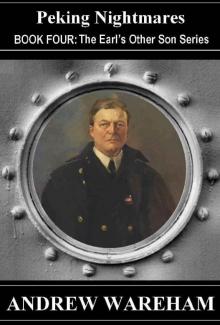 04 Peking Nightmares (The Earl’s Other Son Series, #4)
04 Peking Nightmares (The Earl’s Other Son Series, #4) Red Man
Red Man Foreign Mud
Foreign Mud The Gathering Clouds (Innocent No More Series, Book 1)
The Gathering Clouds (Innocent No More Series, Book 1) 06 A Soldier’s Farewell (Man of Conflict #6)
06 A Soldier’s Farewell (Man of Conflict #6)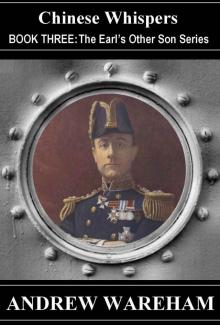 Chinese Whispers
Chinese Whispers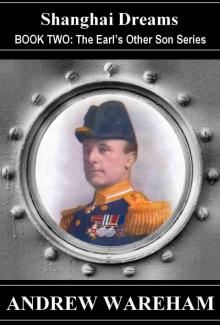 02 Shanghai Dreams (The Earl’s Other Son #2)
02 Shanghai Dreams (The Earl’s Other Son #2) Hungry Harry: An Orphan in the Ranks
Hungry Harry: An Orphan in the Ranks A Wretched Victory (Innocents At War Series, Book 6)
A Wretched Victory (Innocents At War Series, Book 6) Illusions Of Change (A Poor Man at the Gate Series Book 6)
Illusions Of Change (A Poor Man at the Gate Series Book 6) The Wages Of Virtue (A Poor Man at the Gate Series, Book 8)
The Wages Of Virtue (A Poor Man at the Gate Series, Book 8) Blood and Famine (Man of Conflict Series, Book 4)
Blood and Famine (Man of Conflict Series, Book 4) The Friendly Sea (The Duty and Destiny Series, Book 1)
The Friendly Sea (The Duty and Destiny Series, Book 1) Bursting Balloons (Innocents At War Series, Book 5)
Bursting Balloons (Innocents At War Series, Book 5)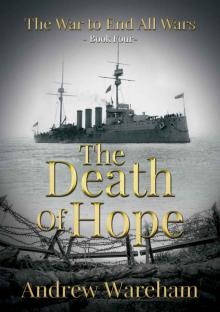 The Death of Hope
The Death of Hope Deadly Shores (The Duty and Destiny Series, Book 11)
Deadly Shores (The Duty and Destiny Series, Book 11) The Vice Of Virtue (A Poor Man At The Gate Series Book 10)
The Vice Of Virtue (A Poor Man At The Gate Series Book 10) Virtue’s Reward (A Poor Man at the Gate Series, Book 11)
Virtue’s Reward (A Poor Man at the Gate Series, Book 11) A Deadly Caper (Innocents At War Series, Book 2)
A Deadly Caper (Innocents At War Series, Book 2) The Pain Of Privilege (A Poor Man at the Gate Series Book 4)
The Pain Of Privilege (A Poor Man at the Gate Series Book 4) Far Foreign (The Duty and Destiny Series, Book 9)
Far Foreign (The Duty and Destiny Series, Book 9)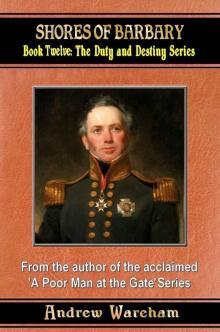 Shores of Barbary (The Duty and Destiny Series, Book 12)
Shores of Barbary (The Duty and Destiny Series, Book 12)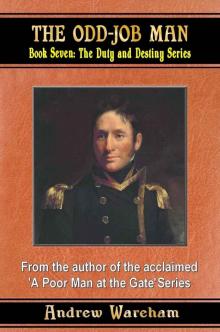 The Odd-Job Man (The Duty and Destiny Series, Book 7)
The Odd-Job Man (The Duty and Destiny Series, Book 7) Fire and Folly (Man of Conflict Series Book 3)
Fire and Folly (Man of Conflict Series Book 3) A Victorian Gent (The Making of a Man Series, Book 1)
A Victorian Gent (The Making of a Man Series, Book 1)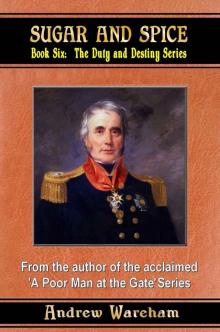 Sugar and Spice (The Duty and Destiny Series, Book 6)
Sugar and Spice (The Duty and Destiny Series, Book 6) Dark Days Of Summer (Innocents At War Series, Book 4)
Dark Days Of Summer (Innocents At War Series, Book 4) Dire Shenanigans (The Making of a Man Series, Book 2)
Dire Shenanigans (The Making of a Man Series, Book 2) The Fuzzy-Wuzzy Man (The Duty and Destiny Series, Book 3)
The Fuzzy-Wuzzy Man (The Duty and Destiny Series, Book 3) Privilege Preserved (A Poor Man at the Gate Series Book 5)
Privilege Preserved (A Poor Man at the Gate Series Book 5) No Longer A Game (Innocents At War Series, Book 3)
No Longer A Game (Innocents At War Series, Book 3)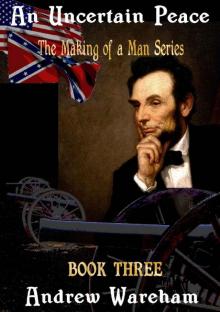 An Uncertain Peace (The Making of a Man Series, Book 3)
An Uncertain Peace (The Making of a Man Series, Book 3)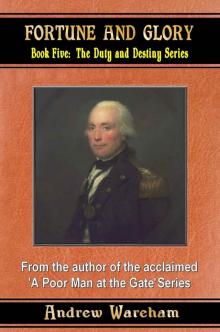 Fortune And Glory (The Duty and Destiny Series, Book 5)
Fortune And Glory (The Duty and Destiny Series, Book 5) The Old Order (A Poor Man at the Gate Series Book 7)
The Old Order (A Poor Man at the Gate Series Book 7) A Place Called Home (Cannibal Country Trilogy, Book 2)
A Place Called Home (Cannibal Country Trilogy, Book 2) Nouveau Riche (A Poor Man at the Gate Series, Book 2)
Nouveau Riche (A Poor Man at the Gate Series, Book 2) The Privateersman (A Poor Man at the Gate Series Book 1)
The Privateersman (A Poor Man at the Gate Series Book 1) Britannia’s Son (The Duty and Destiny Series, Book 4)
Britannia’s Son (The Duty and Destiny Series, Book 4) Long Way Place (Cannibal Country Trilogy, Book 1)
Long Way Place (Cannibal Country Trilogy, Book 1) Spanish Tricks (Man of Conflict Series, Book 5)
Spanish Tricks (Man of Conflict Series, Book 5) A Parade Of Virtue (A Poor Man At The Gate Series Book 9)
A Parade Of Virtue (A Poor Man At The Gate Series Book 9) A Busy Season (The Duty and Destiny Series, Book 8)
A Busy Season (The Duty and Destiny Series, Book 8) Billy Bacon and the Soldier Slaves (Colonial Warrior Series, Book 1)
Billy Bacon and the Soldier Slaves (Colonial Warrior Series, Book 1) Raging Rajahs (Man of Conflict Series, Book 2)
Raging Rajahs (Man of Conflict Series, Book 2) Victorian Dawn (A Poor Man at the Gate Series, Book 12)
Victorian Dawn (A Poor Man at the Gate Series, Book 12) Born To Privilege (A Poor Man at the Gate Series Book 3)
Born To Privilege (A Poor Man at the Gate Series Book 3)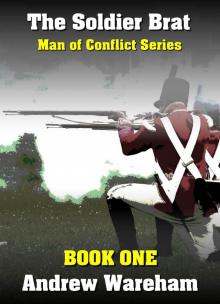 The Soldier Brat (Man of Conflict Series, Book 1)
The Soldier Brat (Man of Conflict Series, Book 1)